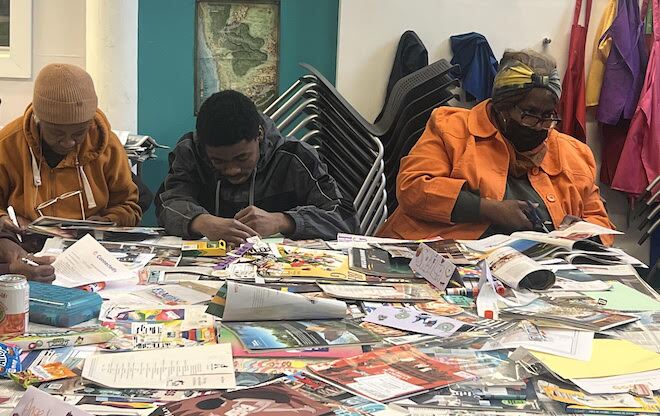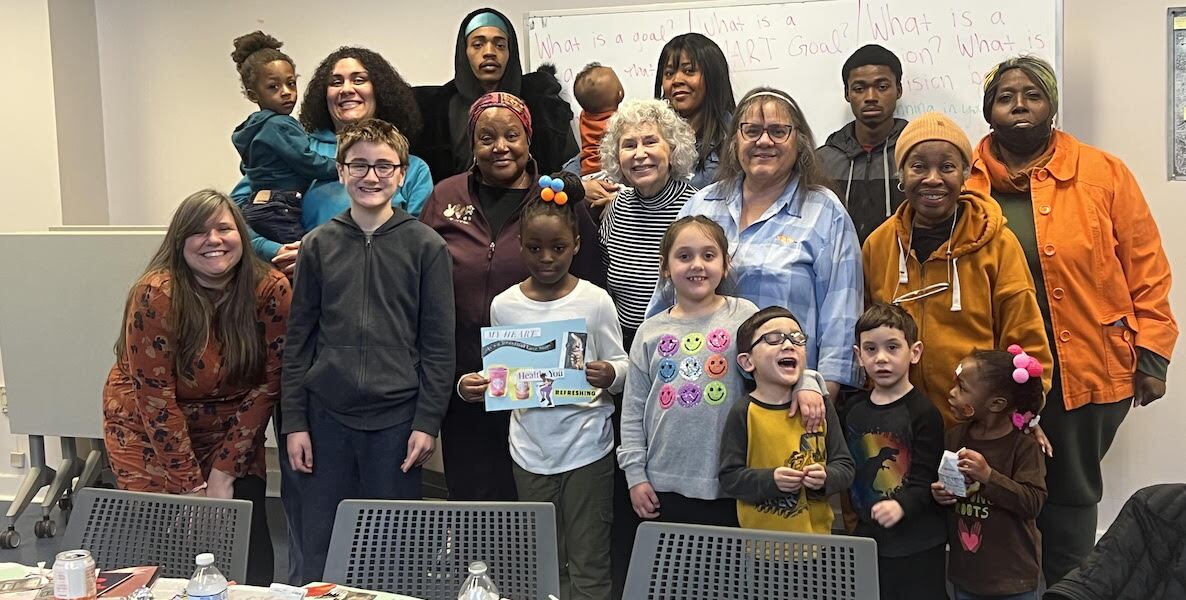When Relina Bonilla left her job to help raise her grandchildren, she didn’t realize how challenging — or lonely — it would be.
The Kensington resident used to work as a Head Start teacher. So when her daughter got custody of her niece and three nephews (Bonilla’s grandchildren), ages four to 11, Bonilla was eager to help raise and teach them. But she soon encountered a number of challenges. She didn’t know how to explain to the kids where — or how — their parents were. It had been a while since she’d raised her own children. Even with her daughter by her side, as a grandparent, she felt incredibly alone.
Bonilla is far from alone in her loneliness. In 2020, 27 percent of U.S. adults over 60 were living alone, and 50 percent were at risk of social isolation. More recent numbers from Philly are higher: 50 percent of our elderly population lives alone, and
While social isolation can affect older adults of any gender, women are more likely to suffer from the condition. They tend to live longer than men, and studies have found many struggle with outliving a spouse or a partner. Throughout their lives, women also tend to talk more frequently with friends and form more lasting relationships, so loneliness sets in when visiting with friends becomes more difficult.
That’s why Bonilla was relieved to find a grandfamily support group run by Connectedly, a Manayunk-based nonprofit that works to relieve loneliness and improve health outcomes in older residents, mostly women. Finally, she had a tribe of people to relate to, and found her strength in numbers. “I didn’t realize that there were so many of us out there,” Bonilla says.
“I believe that [Connectedly] helped grandparents such as myself become more close knit as a family unit individually and as a family in the organization.” — Relina Bonilla, a Connectedly grandparent
Connecting women across Philly
When Merle Drake founded Connectedly in 1984, she called it the Supportive Older Women’s Network. Then a graduate student in social work, Drake was completing a field placement internship at a senior center in Northwest Philly when she realized that, while women enjoyed participating in the center’s activities, they often didn’t form lasting connections or relationships where they could discuss their emotional well-being.
She started a discussion group at the Southwest Senior Center for what she called “matters of the heart” — things like their relationships with their adult children, the struggles after losing a spouse, the decisions around staying at home or moving.
“We’re really looking to meet the needs of older women, making sure that they’re connected so that they can thrive in their life,” says Marypat Tracy, executive director of Connectedly. “As women get older and older, they are not necessarily connected in the workplace. They’re not necessarily connected with their families because their adult children might have moved halfway across the United States.They may not be in the same neighborhoods as in the past. They aren’t as mobile to get out to get advice from others.”
Older Philadelphians face a myriad of challenges, including a high cost of living, low retirement income — 20.8 percent of people over 60 in Philly live in poverty — and older housing stock that almost always includes stairs and maintenance. Of the 206,395 Philadelphia households with an adult over 60 as head of household, more than 17,000 are grandfamilies, like Bonilla’s.
For these reasons, Philly has been rated one of the worst cities for people to age in place, according to a Today’s Homeowner study cited in The Philadelphia Inquirer.
Soon after launching her first group, Drake expanded the Healthy Living Community Groups, as they’re now called, to other neighborhoods. In 2006, the organization created a series of groups and resource guides tailored to the specific needs of grandparents who were raising their grandchildren.
Today, the program serves about 500 women per month with 14 locations — pretty much everywhere except Center City. Over the organization’s lifespan, they’ve served nearly 9,000 women, 70 percent of whom are over age 70, 77 percent who are Black, and 89 percent who self-report as low-income. Any adult over age 50 can participate in the grandfamilies programming; you must be 55 or older for the in-person support groups. Folks over 60 can join teletherapy, whose groups also serve residents in Delaware, Montgomery, Chester and Bucks counties.
“Women often report that they feel like they have somebody that they can confide in, they have a place where they can get resources [because of these programs]. They know that they’re accepted, they are valued. All those things empower women,” Tracy says.

Growing Connectedly
Though the groups provided necessary opportunities for social engagement, they were also constrained by the fact that they met in-person, in senior apartment buildings and rec centers. What about house-bound adults, who may feel more alone exactly because they can’t leave their homes to connect?
Thousands of Philadelphians “can’t get out unless they’re going to a doctor’s appointment or unfortunately if there’s a hospitalization,” Tracy says.
So, about 25 years after its founding — and about a decade before the pandemic mainstreamed the Zoom hangout — Connectedly launched a virtual version of its support groups. These weekly group sessions bring together homebound adults with a licensed clinical social worker, so that they can support one another and receive guidance on everything from personal problems to medical concerns.
The virtual program was so successful that this year, the nonprofit changed its name from the Supportive Older Women’s Network to Connectedly. The gender-neutral name change also reflects the fact that men, too, can participate in their programs. (Still, 98 percent of the current participants are women).
These groups offer sometimes hard to access services. The grandparents group provides resources on healthy eating and child literacy. In Healthy Living and Virtual Counseling, older women help each other navigate the challenges of aging.
Peer support is especially helpful for people who are struggling with the loss, grief and other challenges associated with aging, Tracy says. If someone needs extra support, Connectedly’s facilitators can refer them to additional services or provide one-on-one counseling and support. A 2004 study conducted by Connectedly and Thomas Jefferson University found that their telesupport groups for Alzheimer’s and dementia caregivers reduced depressive systems in many of the participants.
Other health benefits of Connectedly are more difficult to quantify, but Tracy readily recalls small moments that had big impact. In one meeting, an older woman expressed concern about a black mark on her foot. Another woman in the group asked if she was diabetic. When the first woman responded yes, the second urged her to go to the hospital — she, too, was diabetic and knew the spot could be a sign of an emergent blood sugar level issue.
The first woman “probably would have landed in the ER, probably would have had an inpatient stay with a surgery and maybe some rehab afterwards,” Tracy says. “All of that was avoided.”
“We’re really looking to meet the needs of older women, making sure that they’re connected so that they can thrive in their life.” — Marypat Tracy of Connectedly
Reaching more vulnerable older women
This spring, Connectedly is launching the new service Connect4Health in partnership with Penn Medicine and with a $150,000 Innovative Project Support Grant from the Sarah Ralston Foundation. The program will create a screening tool that Penn’s social work team will use to assess older women and line them up with Connectedly if they’re feeling isolated or alone after a hospital stay.
“Our thought was, What if we could connect women who are hospitalized to our program before they’re discharged so that the day that they’re discharged, they know that they’re going to get a call and they’re going to be able to participate in a homebound telephone group with other women?” Tracy says. “Then there won’t be any delay and there won’t be any getting lost in the system.”
The ultimate goal: Reduce health risks and illnesses associated with social isolation, which include heart disease, strokes and dementia. They plan to evaluate the program’s effectiveness using the PHQ-4, a brief questionnaire and screening tool that measures levels of anxiety and depression, and the revised UCLA loneliness scale to track participants.
“I’ve seen a gap between the hospital and home — even if they’re getting home health services,” says Lynette Killen, executive director of The Sarah Ralston Foundation. “
Participants can remain in Connectedly’s groups for as long as they like. Participants in the Healthy Living and telehealth support groups tend to stay five to 10 years. GrandFamily Resource Center participants stay involved anywhere from one to 10 years.
For Bonilla, Connectedly’s groups have made her less isolated and have helped her navigate the challenges of raising her grandchildren. Some of the group’s literacy events have featured books about grandparents raising their grandchildren. She’s also found support from other grandparents in navigating difficult conversations with her grandchildren around their parent’s absence. She enjoys sharing tips with others about how they can encourage healthy eating habits or help with homework. She posts flyers for Connectedly’s groups and encourages other grandparents to join. (Older adults who are interested in getting involved with any of Connectedly’s groups can get in touch with Lori Latimer, Connectedly’s director of programs.)
“I believe that [Connectedly] helped grandparents such as myself become more close knit as a family unit individually and as a family in the organization,” Bonilla says.
Bonilla also appreciates the emotional support they offer. When recalling one meeting, where a gentleman in the grandparents’ group sang a song about thankfulness, she chokes up. Everyone hushed to hear him.
“You could hear an ant crawl,” she says. “When it was over you could hear the sigh of relief, of meditation … A lot of grandparents can’t do this and a lot of grandparents want to and don’t have the means or the ability and that’s where Connectedly comes in.”
This piece is part of a year-long editorial series looking at innovations to address inequities in women’s healthcare, sponsored by Independence Blue Cross.

![]() MORE ON HEALTHCARE FROM THE CITIZEN
MORE ON HEALTHCARE FROM THE CITIZEN



